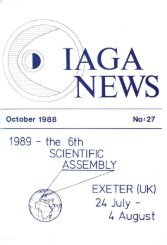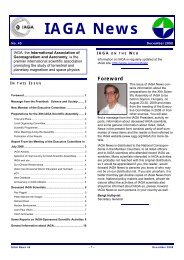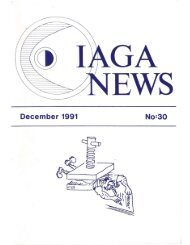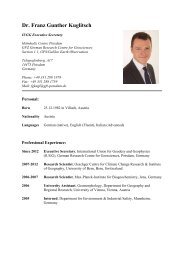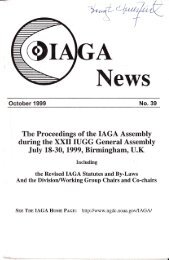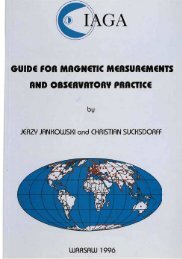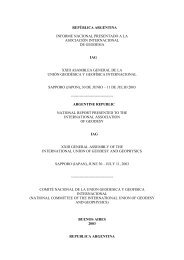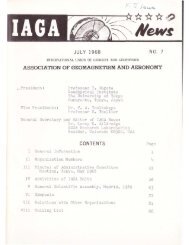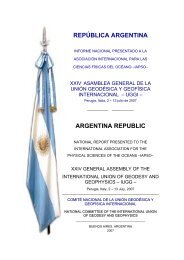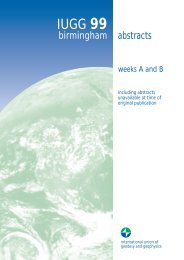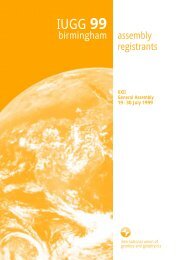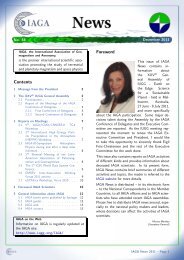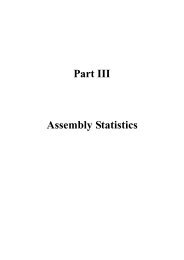xxth GENERAL ASSEMBLY OF IUGG VIENNA (AUSTRIA)
xxth GENERAL ASSEMBLY OF IUGG VIENNA (AUSTRIA)
xxth GENERAL ASSEMBLY OF IUGG VIENNA (AUSTRIA)
- TAGS
- xxth
- assembly
- iugg
- vienna
- www.iugg.org
Create successful ePaper yourself
Turn your PDF publications into a flip-book with our unique Google optimized e-Paper software.
COLUMBUS I EGG<br />
N Fukushima<br />
Geophysics Reserach Laboratory<br />
University of Tokyo<br />
Tokyo 113 JAPAN<br />
IAGA NEWS N0.29<br />
Several years ago I happened to know that English-speaking<br />
people usually do not understand the idiom "Columbus' Egg",<br />
although most of them say that they have read a story about<br />
this episode. In many of languages other than English (even in<br />
Japanese) "Columbus' Egg" is used as an idiom meaning "an<br />
unexpectedly simple solution for a seemingly insoluble<br />
problem" or "unthinkably easy". I found in a Japanese-English<br />
colloquial dictionary that "deceptively easy" will be an<br />
adequate expression to have English-speaking people understand<br />
what is meant by "Columbus' Egg".<br />
In the h istory of sciences, an occasional stepwise advance in<br />
our knowledge is owed in most cases to an idea of "Columbus'<br />
Egg". Hence the progress in sciences is a compilation or<br />
series of "Columbus' Eggs". In these days, English or broken<br />
English is generally used among scientists for international<br />
communication of their opinions or of new results. We<br />
sometimes want to use the idiom "Columbus' Egg" for<br />
introducing our own new ideas with some modesty but it is very<br />
inconvenient that this idiom is unknown in English.<br />
We must be very careful, however, that "Columbus' Egg" has<br />
sometimes other meanings in some languages. I have the<br />
following interesting experience. In November 1987 I had the<br />
honour of giving a public talk in the municipal hall of<br />
Huancayo in Peru in commemoration of the 65th anniversay of<br />
the establishment of Hunacayo Magnetic Observatory. I spoke in<br />
English: my speech was translated into Spanish sentence by<br />
sentence. I use d some viewgraphs on the overhead projector,<br />
all of which are written in English except for the one phrase<br />
"Columbus' Egg" which was written in Spanish. I wanted to<br />
emphasize the importance of ideas of "Columbus' Egg" in the<br />
progress in sciences including geomagnetism.<br />
As soon as I showed the viewgraph with the Spanish phrase of<br />
"Columbus' Egg", the audience began to laugh and I was<br />
embarrassed . I was told later that "Columbus' Egg" in Spanish<br />
has a second meaning, which indicates a male organ. I insisted<br />
that the second meaning should not come to mind becasue I had<br />
showed the word in singular form and not in plural. However,<br />
the reply was "It doesn't matter at all whe the r the word is<br />
given in singular or in plural form".<br />
I used the same viewgraph in my talks t o space scientists in<br />
Argentina and in Brazil (where "Columbus' Egg" was written in<br />
Portugese) with a special remark that this expression is not<br />
49



